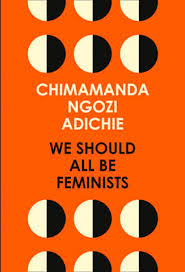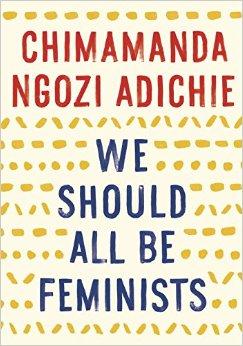 Last International Women’s Day I was in the mood to read something timely and We Should All Be Feminists by Chimananda Ngozi Adichie certainly suggested itself. So picked up my copy and, with a view to publishing my thoughts in a similarly timely and exuberant fashion, re “read the situation from the front to that back”. The book started life as a TED talk given in December 2012, and can be viewed in full on YouTube. While primarily known as a novelist, Adichie’s short text is a recent read and, I am convinced, a necessary one – more so following a second reading.
Last International Women’s Day I was in the mood to read something timely and We Should All Be Feminists by Chimananda Ngozi Adichie certainly suggested itself. So picked up my copy and, with a view to publishing my thoughts in a similarly timely and exuberant fashion, re “read the situation from the front to that back”. The book started life as a TED talk given in December 2012, and can be viewed in full on YouTube. While primarily known as a novelist, Adichie’s short text is a recent read and, I am convinced, a necessary one – more so following a second reading.
However, Adichie’s text should not be taken as a definitive account of modern gender relations, as such. The text acts as an introduction to the surrounding issues which should be discussed more widely. Indeed to call this book a treatise or monograph has the potential to more than miss the point (especially as books regarded as classical feminist texts bore Adichie by her own admission). Yet, in all it’s concision the author is able to cover much ground that should leave readers informed inquisitive.
Perhaps the most striking quality to Adichie’s prose, beyond brevity, is her winning sense of humor. Subject matter such as this is difficult to address, is viable to provoke heated, even violent, responses. Adichie brings a levity that checks such outbursts, and makes for reading that is the more productive for its being enjoyable.
This is best exemplified in how Adichie addresses virginity. In an observation that chimes with the writings Dan Savage, she writes: “We praise girls for virginity but we don not praise boys for virginity (and it makes me wonder how exactly this is supposed to work out, since the loss of virginity is a process that usually involves two people of opposite genders)” (page 32). Depending on where one lives repercussions of such thinking may vary, but the absurdity remains. In the scenario Adichie outlines, the sexual success of one individual results in the sexual failure of another. This is not sustainable.
In another memorable example of wit she explains how earlier in her life the author felt the need to qualify her status as a Feminist owing the the unfavorable – I would say unfair – connotations to which the word has been manacled. Still, I won’t tell you how she (temporarily) attempted to leave-off this semantic baggage that Feminism has accrued over the years, that would be a spoiler to far…
However, there is one matter on which Adichie ruminates that I feel freer in divulging, if only because it is a matter I have devoted no small amount of time to explaining myself. In a phrase: Patriararchy damages men. This a matter that should be blindingly obvious, and yet to so many is not. Adichie explains via an example. In Nigeria a girl was was a gang raped on a University campus. In a horrific act of victim blaming, the public response was to esquire as to why the girl was alone in a room with four boys. Such a response, in all its callousness, is emblematic of persons: “raised to expect so little of men that the idea of men as savage beings with no self-control is somehow acceptable.” (page 33). As a man, I’m sickened (not to mention insulted) to know that there are those who think that my composure is insufficient to my impulses, that somehow they exceed my control, especially when such a deficiency on my part, on the part of men generally, implies total a disregard for another individual’s well-being.
The trouble with any conversation about gender is that it is easily stifled by any prospective audience who perceives such dialogue(s) as determined to articulate that there is something wrong with them. However, the book counters: “The Problem with gender is it prescribes how we should be rather than recognizing what we are” (page 34). Lines like these easy the door open when otherwise it might be slammed shut.
For that reason you may read it and find the book worth lending to one who might otherwise be unreceptive to the conversations the text hopes to spark. We Should All Be Feminists is necessary reading, and a less that 60 pages we’ve no excuse.
0
0









